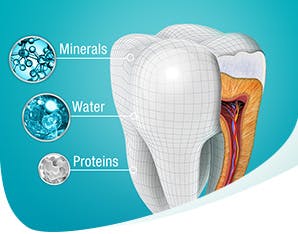Fluoride: How You Get It and Why You Need It
What is fluoride?
Fluoride is a naturally occurring mineral that rapidly enters mineralized tissue, such as bone and developing teeth. It hardens tooth enamel, helping to protect against tooth decay (cavities).
How do you get fluoride?
Fluoride is found in drinking water as well as most toothpastes, mouthwashes, and other dental products. When visiting the dentist, he or she might apply fluoride varnish or fluoride gel to your teeth. Your dentist might also advise that you use a special fluoride rinse, paste, or gel at home.
How important is fluoride?
According to several studies, the fluoride in drinking water alone can reduce the prevalence of dental cavities by up to 50%. What’s more, newer studies show that using fluoride toothpaste will even further reduce your likelihood of getting cavities. If you frequently use dental products (such as toothpaste and mouthwash) with fluoride, your teeth will be better protected against tooth decay.
Fluoride and acid erosion
Not only can fluoride protect your teeth from decay, it can also reduce enamel erosion caused by acid. Acidic foods such as fruit juice, salad dressing, and tomatoes can dissolve your tooth enamel on a daily basis. Adults and children should brush their teeth for two minutes, two times per day to help prevent enamel erosion. By incorporating fluoride products in your daily oral hygiene routine, you can counteract the acid attacks your teeth endure every day.
For more tips on how to care for your teeth, see our article, Better Ways to Brush Your Teeth.




